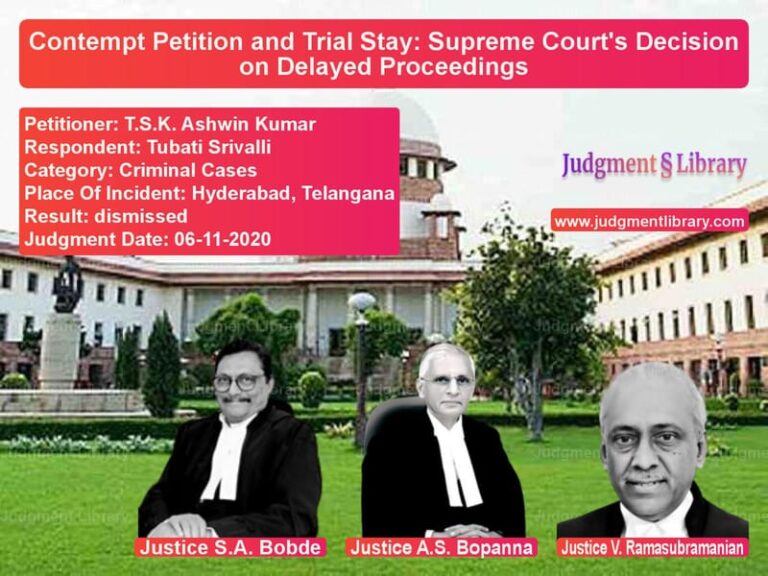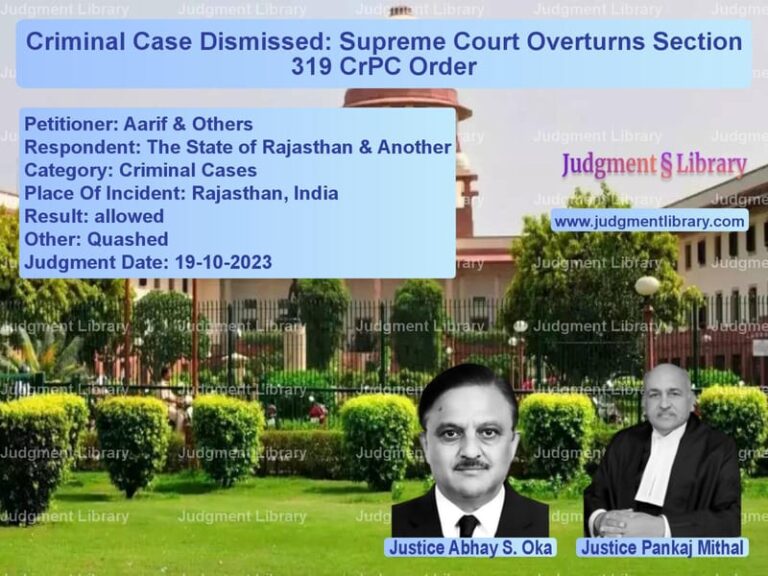Supreme Court Upholds Resolution Plan Under IBC: Commercial Wisdom of CoC Prevails
The Supreme Court of India has upheld the approval of a resolution plan under the Insolvency and Bankruptcy Code (IBC), reaffirming the limited scope of judicial review in insolvency matters. The case, India Resurgence ARC Private Limited v. M/s Amit Metaliks Limited & Anr., involved a dispute over the distribution of proceeds among financial creditors in a corporate insolvency resolution process (CIRP).
Background of the Case
The case arose from the insolvency resolution of VSP Udyog Private Limited, in which India Resurgence ARC Private Limited (the appellant) was a dissenting financial creditor with a 3.94% voting share in the Committee of Creditors (CoC). The resolution plan submitted by Amit Metaliks Limited was approved by 95.35% of the CoC and subsequently sanctioned by the National Company Law Tribunal (NCLT) on October 20, 2020.
The appellant challenged the plan before the National Company Law Appellate Tribunal (NCLAT), arguing that its secured interest had not been adequately considered in the distribution of funds. The NCLAT dismissed the appeal, leading the appellant to approach the Supreme Court.
Arguments by the Petitioner (India Resurgence ARC)
The appellant raised the following key arguments:
- The resolution plan did not take into account the priority and value of its security interest, as required under Section 30(4) of the IBC.
- The CoC should have ensured a fair distribution that considered the security interests of dissenting financial creditors.
- The resolution plan offered the appellant only ₹2.026 crores against its admitted claim of over ₹13.38 crores, despite its security being valued at over ₹12 crores.
- The amendment to Section 30(4) of the IBC in 2019 mandated that the CoC consider security interests while distributing proceeds.
Arguments by the Respondent (Resolution Applicant and CoC)
The respondents defended the resolution plan, stating:
- The CoC’s decision was made using its commercial wisdom, which courts should not interfere with.
- Section 30(4) of the IBC gives discretion to the CoC in determining the distribution of funds and does not mandate any specific allocation.
- The appellant was treated on par with other secured creditors, receiving the same percentage of recovery.
- The objective of the IBC is resolution and revival of distressed companies, not maximization of individual creditor recoveries.
Supreme Court’s Observations and Judgment
1. Limited Scope of Judicial Review
The Supreme Court reaffirmed that courts cannot interfere with the commercial wisdom of the CoC. It held:
“The scope of judicial review remains limited within the four corners of Section 30(2) of the Code for the Adjudicating Authority and Section 30(2) read with Section 61(3) for the Appellate Authority.”
2. Commercial Wisdom of the CoC
The Court emphasized that the CoC’s decision on distribution is final, as long as it does not violate the law. It stated:
“The decision of the CoC regarding feasibility, viability, and distribution among creditors is a matter of business judgment and cannot be interfered with by the courts.”
3. No Entitlement to Full Security Value
The Supreme Court rejected the appellant’s argument that it was entitled to recover the full value of its security interest, stating:
“The appellant’s contention that its security value of ₹12 crores should determine its recovery is misconceived. The IBC does not entitle secured creditors to receive their entire security value in resolution plans.”
4. Equal Treatment of Creditors
The Court found that the appellant was treated equitably in the resolution plan, receiving the same percentage of recovery as other secured financial creditors.
Final Verdict
The Supreme Court dismissed the appeal, upholding the NCLAT’s ruling and stating:
“The resolution plan, having been approved by an overwhelming majority of the CoC, cannot be challenged on the ground of differential treatment unless there is demonstrable unfairness or violation of IBC provisions.”
Conclusion
This ruling reinforces the principle that insolvency resolution is primarily a commercial process, with the CoC holding the authority to decide on fund distribution. It underscores that secured creditors, including dissenting ones, cannot demand full recovery of their security value in resolution plans.
Petitioner Name: India Resurgence ARC Private Limited.Respondent Name: M/s Amit Metaliks Limited & Anr..Judgment By: Justice Vineet Saran, Justice Dinesh Maheshwari.Place Of Incident: Kolkata.Judgment Date: 13-05-2021.
Don’t miss out on the full details! Download the complete judgment in PDF format below and gain valuable insights instantly!
Download Judgment: india-resurgence-arc-vs-ms-amit-metaliks-li-supreme-court-of-india-judgment-dated-13-05-2021.pdf
Directly Download Judgment: Directly download this Judgment
See all petitions in Bankruptcy and Insolvency
See all petitions in Corporate Compliance
See all petitions in Judgment by Vineet Saran
See all petitions in Judgment by Dinesh Maheshwari
See all petitions in dismissed
See all petitions in supreme court of India judgments May 2021
See all petitions in 2021 judgments
See all posts in Corporate and Commercial Cases Category
See all allowed petitions in Corporate and Commercial Cases Category
See all Dismissed petitions in Corporate and Commercial Cases Category
See all partially allowed petitions in Corporate and Commercial Cases Category







